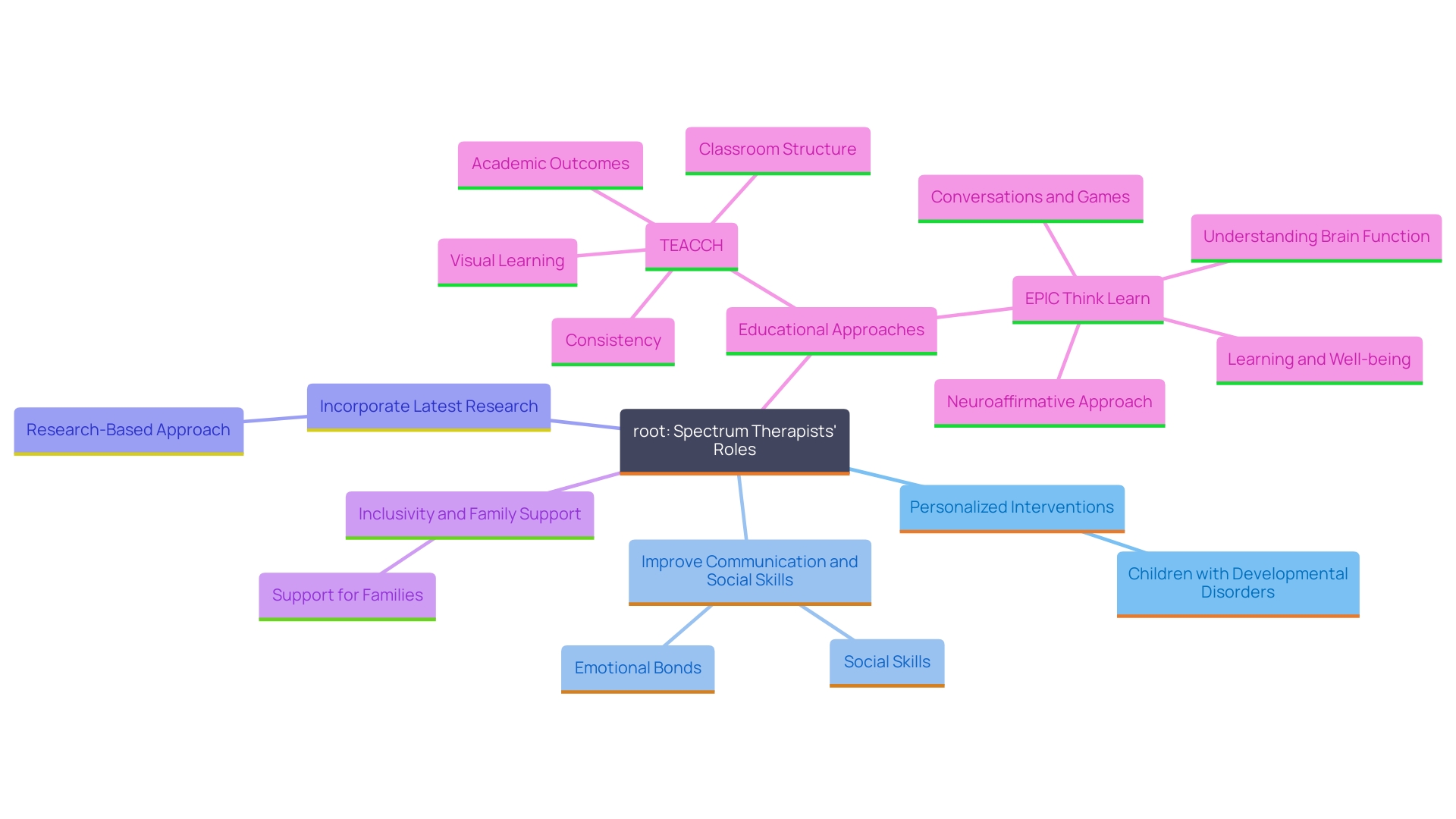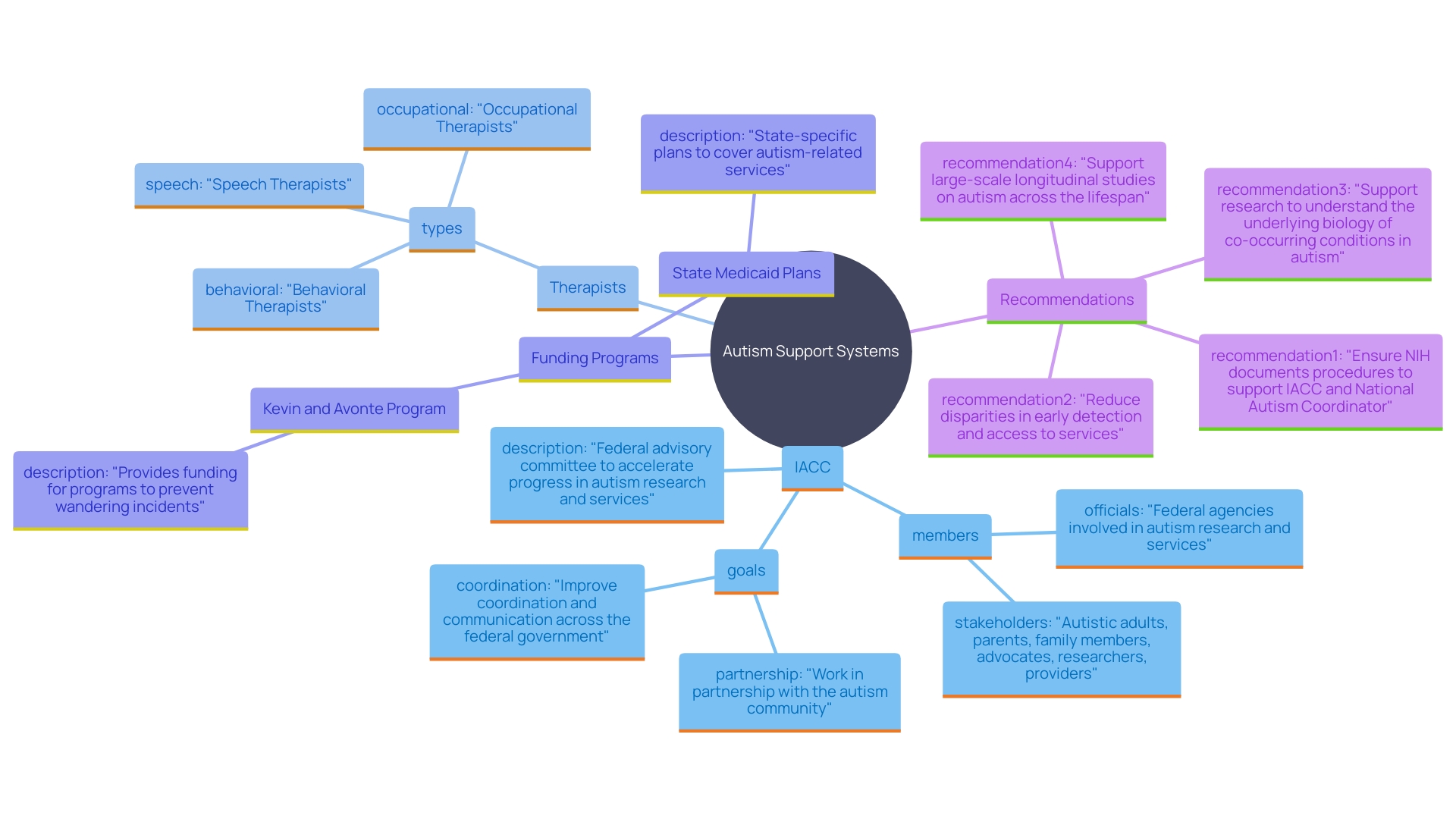Introduction
Autism Spectrum Therapists are pivotal in supporting individuals with autism and their families, employing evidence-based practices to create personalized interventions tailored to each child's unique needs. Their role goes beyond addressing behavioral challenges, focusing also on enhancing communication, social skills, and daily living activities. By staying updated with the latest research and methodologies, these professionals ensure that their interventions are effective and inclusive, fostering growth and independence in children.
Collaboration among a diverse team of professionals, including speech therapists, occupational therapists, and special education teachers, is essential for providing comprehensive care. This multidisciplinary approach maximizes the success of interventions, promoting better communication, social skills, and behavioral development. Effective collaboration and communication among all parties involved, including parents, ensure that children receive consistent and supportive care.
Families and caregivers play a crucial role in the therapeutic process, reinforcing skills learned during therapy and providing emotional support. Their active participation creates a nurturing environment that supports the child's overall development and well-being. Navigating the autism support system can be overwhelming, but therapists guide families through available resources, services, and funding options, ensuring they are well-informed and supported.
Through coordinated efforts, families can better support their children's healthy development and well-being.
Understanding the Role of an Autism Spectrum Therapist
Spectrum therapists play a crucial role in assisting individuals with developmental disorders and their families. These professionals employ evidence-based practices to assess, design, and implement personalized interventions that cater to the unique needs of each child. Their role extends beyond addressing behavioral challenges; they also aim to enhance communication, social skills, and daily living activities. By thoroughly understanding the condition, these therapists develop personalized strategies that promote growth and independence.
A key aspect of their work involves staying updated with the latest research and methodologies. For instance, the Interagency Autism Coordinating Committee (IACC) emphasizes the importance of up-to-date research in selecting effective interventions. The IACC, a federal advisory committee, collaborates with experts from various fields, including autistic adults and family members, to improve autism research and services.
Dr. David (Dan) R. Offord, a celebrated pediatric psychiatrist, emphasized the significance of equal assistance for youngsters, stating, 'I do not mind if my kids are in a race as long as the race is fair.' This sentiment highlights the necessity for inclusive and well-supported involvement of young individuals with disabilities, which is crucial for their mental health and overall development. Autism Spectrum Therapists play a crucial part in ensuring that caregivers have the essential resources to assist their offspring's healthy growth and family wellness.

Key Professionals in Autism Support Services
The landscape of support services for individuals with developmental differences is enriched by a diverse team of professionals collaborating to provide comprehensive care. In addition to Autism Spectrum Therapists, this team often includes speech therapists, occupational therapists, and special education teachers. Every expert offers a distinct array of abilities and knowledge, aiding in a comprehensive strategy that tackles the complex issues encountered by individuals with autism. For example, a speech therapist focuses on speech, language, and social development, employing various methods to address different disorders. On the other hand, a social worker might introduce different strategies that could be more effective for a specific youth.
Collaboration among these professionals is crucial for maximizing the success of interventions. By collaborating with students, their relatives, and other associated service providers, each team member’s distinct perspectives and experiences are utilized to support the young individual. This multidisciplinary approach ensures that the comprehensive needs of the young individual are met, promoting better communication, social skills, and behavioral development.
Through coordinated efforts, families receive enhanced support, and young individuals experience improved outcomes. This collaborative framework aligns with the latest research and recommendations from leading organizations like the National Academies of Sciences, Engineering, and Medicine, which emphasize the importance of bringing together experts from various fields to advance the well-being of individuals on the autism spectrum.
Collaboration and Communication in Autism Therapy
Effective collaboration and communication among professionals involved in a young person's therapy are essential for successful outcomes. Regular meetings and open lines of communication ensure that everyone is aligned on the young one's progress and challenges. This team approach not only enhances the consistency of interventions but also empowers parents by keeping them informed and involved in their offspring's development.
The Interagency Autism Coordinating Committee (IACC), a federal advisory committee, exemplifies this collaborative effort. The IACC brings together officials from various federal agencies, autistic adults, parents, researchers, and other stakeholders to enhance coordination and communication in research and services related to developmental disorders. This model of collaboration can be highly beneficial in creating cohesive and comprehensive intervention plans for young individuals on the spectrum.
Furthermore, the National Academies of Sciences, Engineering, and Medicine emphasize the importance of interdisciplinary collaboration. These institutions regularly convene experts from diverse fields to discuss and debate critical issues, fostering an environment where the scientific process can thrive. Such collaborative efforts are crucial in shaping sound policies and advancing the pursuit of science, which can directly affect the quality of interventions for individuals with autism.
By ensuring that all parties, including parents, are actively engaged and informed, we can create a supportive and effective environment for the young one's development. This comprehensive method acknowledges the significance of alleviating persistent sources of strain and ensuring that caregivers possess the tools they require to promote their offspring's healthy growth and family welfare.
Family and Caregiver Involvement in Autism Therapy
Families and caregivers are essential participants in the therapeutic journey for individuals with autism. Their engagement not only strengthens the skills and knowledge acquired during therapy sessions but also offers vital emotional assistance. By actively participating, caregivers help create a nurturing environment that supports the young one's development and well-being. Therapists often equip family members with specific strategies to manage behaviors and foster positive interactions at home. This collaborative effort is crucial for ensuring that young individuals can thrive in their daily lives. As Dr. David (Dan) R. Offord, a renowned psychiatrist specializing in youth, emphasized, "Engaged, peaceful and well-supported participation of young individuals with disabilities in the major school, home, and leisure domains of their lives is a fundamental determinant of mental health." This involvement is not only important for the individual’s mental health but also a cornerstone of equity, ensuring that every young person has the opportunity to succeed. For autistic youth, particularly those with simultaneous emotional and behavioral issues, this assistance is crucial to avoid exclusion from significant social involvement. Therefore, caregivers must have access to the resources they require to promote their children’s healthy development and their household’s well-being.
Navigating the Autism Support System
Finding one's way through the autism assistance network can feel daunting for households, but therapists play an essential role in alleviating this path. They assist guardians in navigating a variety of available resources, services, and funding options, ensuring that households are well-informed and supported. 'Whether it's linking families with assistance groups, educational materials, or advocacy organizations, therapists are invaluable allies.'. As Dr. David (Dan) R. Offord highlighted, “Active, calm, and well-assisted involvement of children and youth with disabilities in key life areas is a crucial factor for mental well-being.” This guiding principle emphasizes the significance of minimizing stressors and ensuring caregivers possess the resources essential for aiding their children’s growth.
Programs such as the Kevin and Avonte Program, which offers funding to community projects aimed at decreasing wandering occurrences, illustrate the type of assistance that can create a substantial impact. Additionally, state Medicaid plans offer tailored approaches to address the unique challenges faced by the autism community, further demonstrating the broad scope of available assistance. The Interagency Autism Coordinating Committee (IACC) also plays a vital role by facilitating better coordination and communication among various stakeholders, including parents, researchers, and service providers. This collective effort ensures that families receive comprehensive and effective support tailored to their specific needs.

Conclusion
The role of Autism Spectrum Therapists is crucial in providing tailored support and interventions for individuals with autism and their families. By employing evidence-based practices, these professionals not only address behavioral challenges but also enhance communication, social skills, and daily living activities. Their commitment to staying informed about the latest research ensures that interventions are effective and inclusive, fostering growth and independence in children.
Collaboration among various professionals, including speech therapists, occupational therapists, and special education teachers, is vital in creating a comprehensive support system. This multidisciplinary approach allows for a holistic understanding of each child's unique needs, maximizing the effectiveness of interventions and promoting better outcomes. Regular communication among team members and active involvement of families further strengthens this collaborative framework, ensuring that children receive consistent and supportive care.
Family and caregiver involvement is essential in the therapeutic process, as their engagement reinforces skills learned during therapy and provides crucial emotional support. Therapists empower families with strategies to create nurturing environments that promote their children’s well-being. Navigating the autism support system may seem daunting, but therapists serve as invaluable guides, connecting families with resources, services, and funding options that enhance their support networks.
In summary, the combined efforts of Autism Spectrum Therapists, families, and a diverse team of professionals create a powerful framework for supporting children with autism. By prioritizing collaboration, communication, and active family involvement, positive outcomes can be achieved, ensuring that every child has the opportunity to thrive and succeed in their everyday lives.




